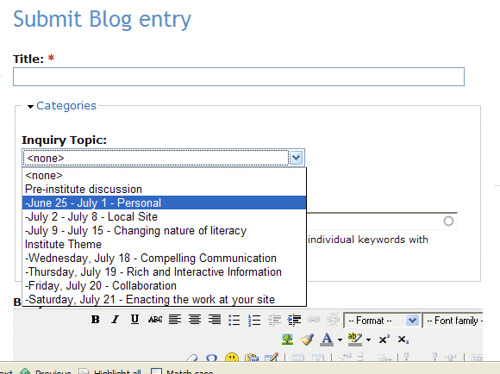This past week, I was invited to present an introductory workshop on digital storytelling to a group of teachers in Alpena. Minus some minor glitches in figuring out file management with brand new jump drives, the session went well from both my perspective and that of the attendees. Exit comments were generally positive and, since I will be working with this group again, the suggestions will be very helpful, too.
Yet, in the section of the evaluations that asked teachers to rank items such as the objectives of the workshop being met, the organization, and so forth, all the positive responses were overshadowed by one question that received unusually low marks: “The impact this inservice will have on my teaching will probably be…” Responses here were at least one point lower, on average, than every other category.
This struck me as interesting because, throughout the day, we had been having discussions about access in their schools: access to computer labs and equipment, access to certain websites (such as Flickr), and access to time for planning and implementing such a project. As I reviewed these lower scores, then, I saw them not so much as a reflection on the workshop itself as much a reflection on the school contexts to which these teachers would return the next day.
I write this here not to speculate on any particular way to solve this problem, since we know the digital divide is still evident in all of our work, even in the most well endowed schools. Yet, I found it interesting that a group of engaged professionals who found the process of digital storytelling valuable and wanted to do it with their students felt, at the end of the day, as if this wouldn’t necessarily impact their classrooms due to these issues.
Moreover, I shouldn’t sound bleak, because I know that enacting professional development in the classroom is a long term-process. I wouldn’t be doing this kind of work if I didn’t believe in sustainable change over time.
Yet, these evaluations were a concrete reminder of the very real challenges that even the most motivated teachers will face. This might explain why, at a school that has nearly unlimited technology resources, Patrick Welsh explains why teacher morale is so low. He states:
Of course, the big question isn’t whether teachers like spending their time learning one new gizmo after another, but whether a parade of new technologies will help kids learn. From what I can see, that’s not the case.
I disagree with Welsh’s final claim. What I see is that technologies can help kids learn, if teachers are able to think critically about how to use them.
Yet, even with the time for professional development, sustained inquiry, and collaboration, they walk back into their classrooms with incredible demands on their time and attention that may make digital writing and digital teaching difficult, if not impossible, for them.
Apart from the idea that we give teachers more time or get more computers, what this raises for me is the idea that we have to do to shift our professional focus from “using the tools” to “engaging in literacy practices,” and all the subsequent shifts in teaching and learning that will result.
The problem, then, is how to continue that conversation, while still addressing the day-to-day needs of teaching.

This work is licensed under a
Creative Commons Attribution-Noncommercial-Share Alike 3.0 United States License.

 We have taken those themes again this year and set up online discussions, writing prompts, and other activities around them to lead participants through a series of questions related to the theme as well as to the work of their site. Paul Allison has been instrumental in setting up
We have taken those themes again this year and set up online discussions, writing prompts, and other activities around them to lead participants through a series of questions related to the theme as well as to the work of their site. Paul Allison has been instrumental in setting up